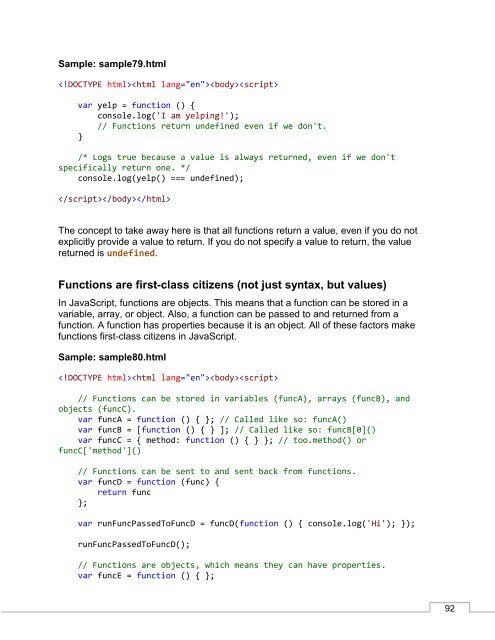JavaScript_Succinctly
You also want an ePaper? Increase the reach of your titles
YUMPU automatically turns print PDFs into web optimized ePapers that Google loves.
Sample: sample79.html<br />
<br />
var yelp = function () {<br />
console.log('I am yelping!');<br />
// Functions return undefined even if we don't.<br />
}<br />
/* Logs true because a value is always returned, even if we don't<br />
specifically return one. */<br />
console.log(yelp() === undefined);<br />
<br />
The concept to take away here is that all functions return a value, even if you do not<br />
explicitly provide a value to return. If you do not specify a value to return, the value<br />
returned is undefined.<br />
Functions are first-class citizens (not just syntax, but values)<br />
In <strong>JavaScript</strong>, functions are objects. This means that a function can be stored in a<br />
variable, array, or object. Also, a function can be passed to and returned from a<br />
function. A function has properties because it is an object. All of these factors make<br />
functions first-class citizens in <strong>JavaScript</strong>.<br />
Sample: sample80.html<br />
<br />
// Functions can be stored in variables (funcA), arrays (funcB), and<br />
objects (funcC).<br />
var funcA = function () { }; // Called like so: funcA()<br />
var funcB = [function () { } ]; // Called like so: funcB[0]()<br />
var funcC = { method: function () { } }; // too.method() or<br />
funcC['method']()<br />
// Functions can be sent to and sent back from functions.<br />
var funcD = function (func) {<br />
return func<br />
};<br />
var runFuncPassedToFuncD = funcD(function () { console.log('Hi'); });<br />
runFuncPassedToFuncD();<br />
// Functions are objects, which means they can have properties.<br />
var funcE = function () { };<br />
92



